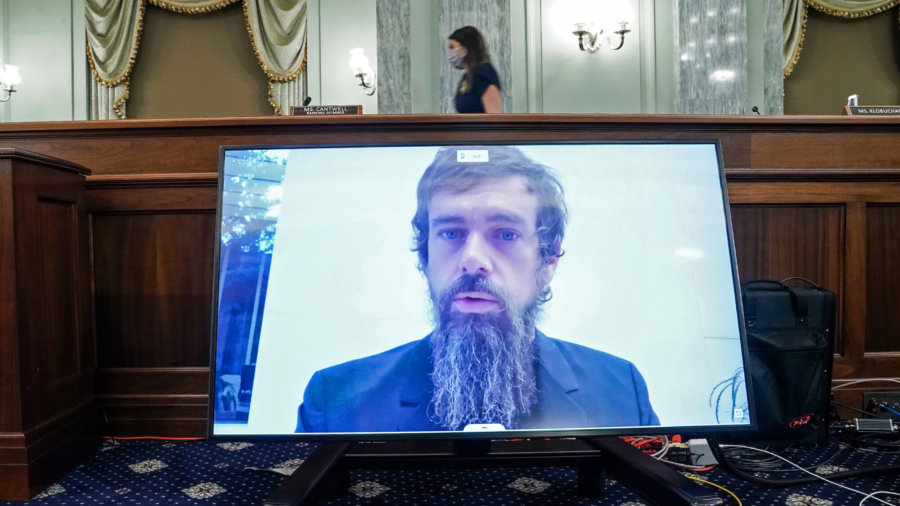Senators grilled the CEOs of Twitter, Facebook, and Google over alleged anti-conservative biases on their platforms during a hearing on their moderation practices. It comes amid a cloud of growing, bipartisan antitrust scrutiny and concerns over the censorship of a New York Post report.
The Oct. 28 Senate Commerce Committee hearing titled “Does Section 230’s Sweeping Immunity Enable Big Tech Bad Behavior?” quickly turned into a battle of opposing arguments.
Democrats accused the hearing of being politicized, pointing to the timing of the election less than a week away, with some like Sen. Brian Schatz (D-Hawaii) calling the session “bullying” and “nonsense.” Republicans meanwhile accused the companies themselves of interfering in the election.
In opening statements, Twitter CEO Jack Dorsey, Alphabet Inc. CEO Sundar Pichai, and Facebook CEO Mark Zuckerberg sought to make the argument that stripping Section 230 protections would stifle free speech, and called for alternate regulatory solutions. They largely agreed that more transparency over their content moderation practices is needed.
At one point, Sen. Ted Cruz (R-Texas) questioned Dorsey over Twitter’s censorship of the Oct. 14 New York Post article. “Mr. Dorsey, who the hell elected you and put you in charge of what the media are allowed to report and what the American people are allowed to hear?”
“We are not doing that,” Dorsey replied. “This is why I opened this hearing for calls for more transparency … We hear the concerns.”
Dorsey admitted that the blocking of the Post’s URL on Twitter was wrong: “We recognized an error in policy, we changed it in 24 hours,” he said, noting that anyone can share the link to the article now.
At the time, Twitter claimed the Post article violated its “Hacked Materials Policy” before changing the policy after widespread backlash.
New York Post’s Twitter account can be unlocked if they delete their original tweet, Dorsey said, adding that they would then be able to share the link freely. In a follow up after his questioning, Cruz claimed that he tried to share the Post’s story on Twitter but couldn’t. An hour later, Cruz claimed the article could be shared.
The crux of the issue is Section 230. Publishers can be held liable for any content they post, while social media platforms are protected by Section 230 of the Communications Decency Act, which states that “no provider or user of an interactive computer service shall be treated as the publisher or speaker of any information provided by another information content provider.”
Critics say these companies, which claim to be platforms, aren’t only maintaining a public forum but are also moderating its content, effectively making them publishers.
Cruz told The Epoch Times last week that Big Tech CEOs “are acting as Democrats’ willing henchmen, and they have more power than William Randolph Hearst at the height of yellow journalism could have only imagined.”
During the hearing, all three CEO’s (who testified virtually) agreed the companies should be held liable if the platforms act as publishers.
Senate Commerce Chairman Roger Wicker (R-Miss.) said in his opening statement that he is concerned these platforms have “become powerful arbiters of what is true and what content users can access.” He rejected the notion that any criticism was due to partisan politics.
“Although some of my colleagues on the other side of the aisle have characterized this as a purely partisan exercise, there is strong bipartisan support for reviewing Section 230,” Wicker said. “In fact, both presidential candidates Trump and Biden have proposed repealing Section 230 in its entirety—a position I have not yet embraced.”
Wicker, like other Republican Senators in the hearing, brought up the censorship of the New York Post article on Hunter Biden. He decried what he called a double standard, pointing out that the New York Times story on the president’s illegally leaked tax returns was not censored. And that the now-discredited Steele dossier was widely shared without fact-checking or disclaimers.
“This apparent double standard would be appalling under normal circumstances,” he said. “But the fact that selective censorship is occurring in the midst of the 2020 election cycle dramatically amplifies the power wielded by Facebook and Twitter.”
It’s not just politicians who worry about censorship on social media platforms. Roughly three-quarters of U.S. adults say it is “very likely” or “somewhat likely” that social media sites “intentionally censor political viewpoints that they find objectionable,” according to an August survey by the Pew Research Center.
While people across the political spectrum believe censorship is taking place, the belief is particularly strong among Republicans, the Center said.
During the hearing, Zuckerberg went further than some of the other CEOs over what to do about Section 230. He acknowledged at one point that Congress “should update the law to make sure it’s working as intended.”
Dorsey and Pichai however warned that any changes could have major ramifications.
“Undermining Section 230 will result in far more removal of online speech and impose severe limitations on our collective ability to address harmful content and protect people online,” Dorsey said.
Conservatives have long accused Big Tech of censoring political speech, particularly that of those on the right. Democrats and Big Tech have repeatedly denied such targeted suppression exists.
Federal Communications Commission (FCC) Chairman Ajit Pai has said that his agency will move forward with President Donald Trump’s petition to clarify the meaning of the law.
In an Oct. 15 statement, Pai said the “FCC has the legal authority to interpret Section 230,” adding that “members of all three branches of the federal government have expressed serious concerns” about the interpretation of Section 230.
Trump has also floated the idea of completely repealing Section 230 protections.
“If Big Tech persists, in coordination with the mainstream media, we must immediately strip them of their Section 230 protections,” he said in an Oct. 15 Twitter post. “When government granted these protections, they created a monster!”
Reuters contributed to this report
From The Epoch Times


